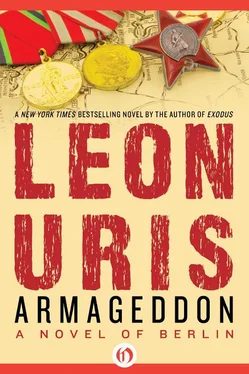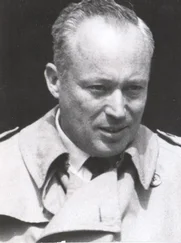Armageddon - Leon Uris
Здесь есть возможность читать онлайн «Armageddon - Leon Uris» весь текст электронной книги совершенно бесплатно (целиком полную версию без сокращений). В некоторых случаях можно слушать аудио, скачать через торрент в формате fb2 и присутствует краткое содержание. Жанр: Старинная литература, на английском языке. Описание произведения, (предисловие) а так же отзывы посетителей доступны на портале библиотеки ЛибКат.
- Название:Leon Uris
- Автор:
- Жанр:
- Год:неизвестен
- ISBN:нет данных
- Рейтинг книги:4 / 5. Голосов: 1
-
Избранное:Добавить в избранное
- Отзывы:
-
Ваша оценка:
- 80
- 1
- 2
- 3
- 4
- 5
Leon Uris: краткое содержание, описание и аннотация
Предлагаем к чтению аннотацию, описание, краткое содержание или предисловие (зависит от того, что написал сам автор книги «Leon Uris»). Если вы не нашли необходимую информацию о книге — напишите в комментариях, мы постараемся отыскать её.
Leon Uris — читать онлайн бесплатно полную книгу (весь текст) целиком
Ниже представлен текст книги, разбитый по страницам. Система сохранения места последней прочитанной страницы, позволяет с удобством читать онлайн бесплатно книгу «Leon Uris», без необходимости каждый раз заново искать на чём Вы остановились. Поставьте закладку, и сможете в любой момент перейти на страницу, на которой закончили чтение.
Интервал:
Закладка:
Sean stuffed his notes and papers into his briefcase. The two men were alone in the great hall. The legend blared down at them from the faded tapestry. Sean snapped his case shut. The coldness between him and Falkenstein was like that of the stone fireplace. “They hate me, don’t they, Falkenstein?” Sean found himself saying.
“On the contrary, Major O’Sullivan. You have earned the position as their father and their leader. Those are two things a German understands. You see for yourself how well they obey you. Once the German is defeated he is quite manageable.”
“But they don’t even know what the hell I was talking about.”
“I think you are far too impatient, Major. We may be ancient in our traditions but we are infants in the democratic experience. Our first venture with a republic, the Weimar, ended in disaster. The subtleties of democratic process are beyond their comprehension.”
“But they do understand father and obedience. So we’re in for another cycle of it when another father leads them to destruction.”
Falkenstein straightened up a bit. “You conveniently forget the great things the German people have given the world. These are the Germans I love and believe in. This is the Germany I fight for.”
Sean was tempted to argue the point. Yes, there were great contributions in literature and music and science. However, there had never been a lasting German ideal of freedom and damned few of the dignity of man. Even their greatest reformer, Martin Luther, was a dogmatic tyrant. And here, Ulrich Falkenstein, who had suffered untold brutality at the hands of this society, stubbornly refused to give up his identity or his faith. It was admirable nonsense to Sean. To believe so strongly was good; but it was beyond any man’s vision to feel the German people would change. They both sensed the conversation had hit an impasse.
“We all fear,” Falkenstein broke the ice, “that you have committed your last official act in Rombaden?”
“That may be so,” Sean said.
“That would be a shame. You have been hard but you have never been unfair. You see, Major O’Sullivan, there are subtleties of democracy that even I cannot comprehend. For example, why does a man of your stature throw away a brilliant career in the protection of an Emma Stoll?”
“It seems to me, Heir Falkenstein, that is a strangely put question from one who was convicted by a Hitler court.”
“Surely you do not intend to compare me to Emma Stoll.”
“Of course not. But I do challenge a Hitler court to exist in the name of my country.”
“It is a pity you won’t be going to Berlin with me when I am able to. Frankly, we both have a lot to learn. On the other hand, I have a feeling that you don’t really want to know that there are good Germans.”
Sean shot him an angry glance, then stifled his anger. “You said yourself, I have been fair.”
“Fair, yes. Like a dog trainer. But even an animal can smell when he is hated.”
“Herr Falkenstein,” he said, “I have written a full report for the incoming commander in case someone other than Captain Duquesne is selected. I have strongly recommended that he place full trust in you in all matters.”
They shook hands with great reservation and completely without affection. Yet, an undeniable mutual admiration existed between the two men.
“Good luck, Major,” Falkenstein said, and left the great hall.
And then, Sean was alone.
Sean found himself wandering through a maze of narrow streets. He had arranged that there would be no farewells, no sentimentality. In the morning he would leave, supposedly on a routine trip to Supreme Headquarters ... no more, no less.
A battalion of laborers, prisoners of war, with Polish guards hacked into the endless rubble piles at one of the intersections. As they saw the commander the Germans stopped their work for an instant, stared, doffed their caps, and bowed as he passed. The Poles greeted him with formal salutes and smiles, but Sean was oblivious to them.
Now was the time to make one’s balance sheet. There could be a balance sheet for Liam and Timothy O’Sullivan. There was one for Nan Milford ... losses, gains, happiness, sadness. But there would be no balance for either Rombaden or Sean O’Sullivan.
A few dim, hopeful signs rose curiously in the sunlight in the sea of ruin. The people of Rombaden were working with amazing energy. They had used great ingenuity in the creation of jobs and in using rubble for raw material for a dozen enterprises.
But the digging out would continue for months, perhaps years. A single classroom had been opened without Nazi teachers or Nazi textbooks. A single four-page newspaper and a twenty-five-watt hand-generated radio station represented the press. Half the population had filled out the dreaded Fragebogen. Many of the Nazis were reduced to common labor. Now there was an application to form several trade unions and even a request to begin a political party ... these were signs, however small.
On the other side, the scales weighed heavily. Sean knew now that de-Nazification, in reality, would never work. One does not kill two hundred thousand forming the heart of the Nazi cancer and punish sixteen million others without oneself becoming a Nazi. In the British Zone it was becoming apparent that only the top Nazis would be tried, these trials for showcasing. The French, who realistically had to continue to live next to the Germans, could only pay later for vengeance now.
Nonfraternization was starting to break down. The new troops who had not seen combat were not so hostile toward the Germans, and the good old generous Yankee hearts began to show. American soldiers could not resist giving chocolate to children. And why not, Sean wondered? Were we ever taught to let children starve? Is it our way?
Also, soldiers are men and men needed women—and they would find them, nonfraternization notwithstanding. Certainly, as commander, Sean could make it dangerous, but never dangerous enough to stop it.
Only yesterday he saw something at his own residence that set him thinking. Two of his guards were helping his old servants, Alfred and Heidi Oberdorfer, repair their shattered cottage.
“Goddamn,” Sean whispered aloud, “we are lousy conquerors.”
The scales had dropped even lower—another cut in food ration had been ordered. How long would the energy of the people last? And when winter comes their bodies will demand hundreds more calories for heat. Sean had a foreboding that God would make this winter a severe one.
The food crisis was hastening the black market and bringing on massive prostitution. Crime and venereal disease would follow in natural course.
Sean turned into Princess Allee. Behind the half-smashed facades there were sounds of laughing men and women. It was a strange sound in Rombaden—at least the Poles and the whores had full bellies and bootleg rotgut. The competition to become an “official” Princess Allee whore was intense.
As they saw Sean O’Sullivan walking down the middle of their street they ducked into doorways. The incongruous sound of a woman singing reached his ears; it came from a makeshift cabaret in a cellar. Sean leaned against the doorframe, looked down into the rancid-smelling den. Her husky voice sang:
Du, Du liegst mir im Herzen,
Du, Du liegst mir im Sinn;
Du, Du machst mir viel Schmerzen,
Weisst nicht, wie gut ich dir bin.
A bit of sentimental tripe from another age:
You, you live in my heart,
You, you live in my soul,
You, you cause me great sorrow,
You don’t know how good I am for you.
A resounding chorus of men and women’s voices picked up the song and they thumped mugs on the heavy oaken tables and sang Ja! Ja! Ja! Ja! Everything came to a terrified halt as they saw Sean. He shook his head and walked out quickly.
Читать дальшеИнтервал:
Закладка:
Похожие книги на «Leon Uris»
Представляем Вашему вниманию похожие книги на «Leon Uris» списком для выбора. Мы отобрали схожую по названию и смыслу литературу в надежде предоставить читателям больше вариантов отыскать новые, интересные, ещё непрочитанные произведения.
Обсуждение, отзывы о книге «Leon Uris» и просто собственные мнения читателей. Оставьте ваши комментарии, напишите, что Вы думаете о произведении, его смысле или главных героях. Укажите что конкретно понравилось, а что нет, и почему Вы так считаете.











